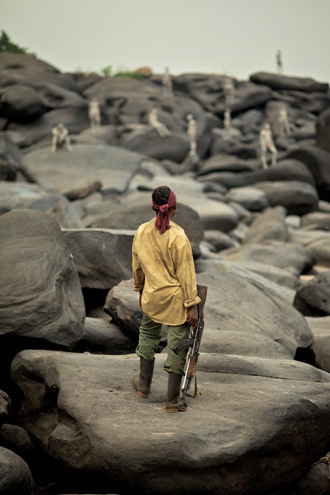
As the 16-year-old Congolese actress Rachel Mwanza made her way down the red carpet at last Sunday’s Academy Awards, millions of people were exposed to the tragic and resilient stories of Mwanza and her award winning character in “War Witch” (“Rebelle”), Komona.
The Oscar-nominated film “War Witch” is an understated and moving story about a resourceful heroine who is forced to become a child soldier in a war against the government of an unidentified African nation. While Mwanza’s brave portrayal of Komona earned her the Best Actress Award at the Tribeca Film Festival and the Berlin International Film Festival, her life story is also one of heroism. After her parents abandoned her when she was young Mwanza became homeless and, with nowhere else to turn, ended up living in the streets of Kinshasa. The U.S. Department of State estimates that between 25,000 and 50,000 child refugees, war orphans, and children accused of witchcraft or sorcery are living on the streets in cities throughout Congo, though this number is difficult to pinpoint due to the transient nature of the problem. A $10 million World Bank project that targets street children in Kinshasa aims to provide assistance and support to 8,000 street children by 2015. In the two years since the initiation of the project in February 2011 thousands of street children have been provided psychosocial support, given medical care, offered shelter and afforded free primary education.
The filmmakers first spotted Rachel Mwanza in a documentary on street kids in Kinshasa, and traveled to the city to meet her in person and cast her in their film. Because of her participation in the award-winning project, Mwanza is being provided with some provisions similar to those mentioned above. The film’s director and producers have reportedly helped secure for the Congolese actress a place to stay, food, and an education at least until Mwanza turns 18, when she will be given a small amount of money to invest freely in her future.
Rachel Mwanza’s film portrayal and real-life story place much-needed attention on the atrocities being committed at the societal level against civilians. As the film portrays Komona’s journey into adulthood against the backdrop of civil war, film viewers are confronted with the real-life atrocities surrounding the use of child soldiers by rebel militias in the violent civil conflict of eastern Congo and beyond. At the peak of the Congolese army’s recruitment of child soldiers an estimated 30,000 children were available for combat. After the implementation of many initiatives to disarm, demobilize, and rehabilitate minors in Congo’s armed forces, in combination with the indictment of many military officials by the ICC on charges including the recruitment and use of child soldiers in combat, the estimated number of child soldiers involved in combat in 2007 dropped to 12,000. However, “since the start of the M23 rebellion in April 2012, M23 fighters have been responsible for … forced recruitment of children,” reports Human Rights Watch. The recruitment of child soldiers in eastern Congo, as highlighted by “War Witch,” continues to be a grave problem in the decades long conflict.
“War Witch” opens today in New York.
Photo: Rachel Mwanza as Komona in "War Witch" (Tribeca)

